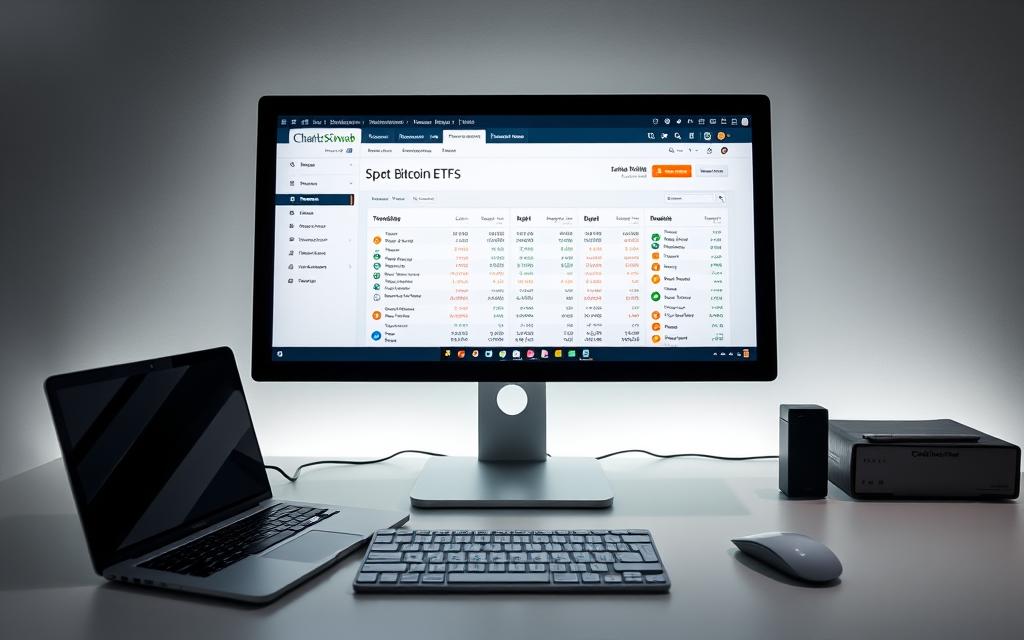Table of Contents
Charles Schwab does not support direct purchases of digital currencies like Bitcoin or Ethereum. However, investors still have several ways to gain exposure to this growing market through the platform.
The brokerage offers spot Bitcoin ETFs, approved by the SEC in early 2024. These funds track the live price of Bitcoin, providing a regulated alternative to holding crypto directly.
Other options include crypto-related stocks, futures trading, and blockchain-themed investments. Schwab stands out with $0 trade commissions and no account minimums for select products.
This guide explores practical methods, risks, and alternatives for those interested in cryptocurrency investment through Schwab. Understanding these options helps investors make informed decisions.
Understanding Charles Schwab’s Cryptocurrency Offerings
Investors looking for crypto exposure through Charles Schwab won’t find direct purchases available. The brokerage restricts transactions involving digital currencies like Bitcoin, citing regulatory and security concerns. Instead, Schwab provides alternative paths to tap into the crypto market.
Does Schwab Allow Direct Cryptocurrency Purchases?
No. Unlike dedicated exchanges, Schwab prohibits buying or selling cryptocurrencies directly. This policy aligns with its focus on regulated assets. Clients must explore indirect options, such as ETFs or stocks tied to blockchain technology.
Indirect Crypto Exposure: ETFs and Other Products
Spot Bitcoin ETFs, approved in 2024, let investors track Bitcoin’s price without wallets. Schwab offers these alongside blockchain-themed portfolios. These bundles include 25+ stocks like Coinbase and Riot Platforms.
For advanced traders, crypto futures are available but require account approval. Note: The IRS treats crypto as property, meaning tax forms must report gains or losses.
Can I Buy Cryptocurrency Through Schwab? Here’s How
Investors seeking crypto opportunities through Charles Schwab have multiple indirect options. The platform offers regulated products like ETFs and thematic portfolios for diversified exposure. Below are the most practical strategies.
Spot Bitcoin and Ether ETFs
Schwab’s Fund Finder lists 12+ spot Bitcoin and Ether ETFs under “digital assets.” These track live prices without requiring wallets. Popular choices include:
- iShares Bitcoin Trust ($IBIT)
- Grayscale Ethereum Trust ($ETHE)

These funds trade like stocks, with $0 commissions for Schwab clients. They’re ideal for long-term holdings due to lower volatility versus futures.
Schwab Investing Themes for Blockchain Exposure
Thematic bundles simplify investing in blockchain companies. Schwab’s “Blockchain Technology” theme includes:
- MicroStrategy (a major Bitcoin holder)
- Marathon Digital (mining operations)
Fractional shares are available with a $250 minimum. This approach diversifies risk across multiple stocks.
Crypto-Related Stocks and Futures
For advanced traders, futures contracts offer leveraged bets on Bitcoin price swings. Schwab provides access to CME-listed futures but warns:
- High margin requirements
- Short-term expiration dates
Compared to spot Bitcoin ETFs, futures suit aggressive strategies. Beginners should prioritize ETFs or crypto-linked investments with steadier returns.
Step-by-Step Guide to Buying Crypto-Linked Products at Schwab
Getting started with crypto-linked investments at Schwab requires a brokerage account. The platform’s structured process ensures investors gain exposure to digital assets securely. Below, we break down the essentials.
Opening a Schwab Brokerage Account
Account registration takes 10 minutes online. Provide your SSN, ID verification, and funding details. Schwab supports transfers from banks or existing brokerages.
Key features include:
- $0 minimums for most accounts
- Instant access to trading services after approval
Navigating Fund Finder for Digital Assets
Schwab’s Fund Finder tool filters products by category. Search “digital assets” to uncover spot Bitcoin ETFs like:
| ETF | Expense Ratio | Commission |
|---|---|---|
| iShares Bitcoin Trust ($IBIT) | 0.25% | $0 |
| Grayscale Bitcoin Trust ($GBTC) | 1.50% | $0 |
“Spot ETFs offer long-term stability compared to futures, with lower expense ratios.”
Schwab automates tax forms (1099-B) for all transactions. This simplifies reporting for investors during tax season.
Comparing Schwab’s Crypto Investment Options
Charles Schwab provides multiple ways to gain exposure to digital assets without direct ownership. Each method comes with distinct features, fees, and risk levels. Understanding these differences helps investors choose the best strategies for their goals.

ETFs vs. Futures vs. Thematic Investing
Spot Bitcoin ETFs offer simplicity and lower volatility compared to other options. These funds track live prices with no leverage, making them ideal for long-term holdings.
Futures contracts involve higher complexity. They require margin accounts and expose traders to rapid price swings. In 2022, Bitcoin futures saw drawdowns exceeding 60%.
Thematic portfolios bundle blockchain stocks like MicroStrategy and Coinbase. This approach diversifies investment across 40+ sectors, including AI and cybersecurity.
Fees and Minimums Explained
Costs vary significantly across Schwab’s crypto-linked products. Below is a detailed breakdown:
| Product | Minimum Investment | Fees |
|---|---|---|
| Spot Bitcoin ETFs | $0 | 0.20%–2.00% |
| Futures Contracts | $5,000+ margin | $2.25 per contract |
| Thematic Portfolios | $250 | $0 trades |
“ETFs provide cost-efficient exposure, while futures suit aggressive traders comfortable with leverage.”
Performance also differs. Year-to-date, Bitcoin ETFs gained 120%, outpacing the S&P 500’s 14% rise. For beginners, ETFs or thematic investments often work best.
Risks of Investing in Cryptocurrency Through Schwab
While Schwab offers indirect access to digital assets, understanding potential pitfalls is crucial. Market swings, regulatory shifts, and security threats require careful evaluation before committing funds.

Volatility and Market Risks
Cryptocurrencies exhibit extreme price fluctuations compared to traditional assets. Bitcoin’s 30-day volatility averages 80%, dwarfing the S&P 500’s 15%.
Recent history shows dramatic swings:
- 70% drop in 2022
- 150% rebound in 2023
This volatility makes crypto-linked investments unsuitable for short-term goals or risk-averse portfolios.
Regulatory and Security Considerations
The SEC’s 2023 lawsuits against Binance and Coinbase highlight ongoing compliance battles. Chair Gary Gensler warns:
“Many crypto platforms operate outside securities laws, exposing investors to unnecessary risks.”
Key protections to note:
| Protection Type | Covers Crypto? | Details |
|---|---|---|
| SIPC Insurance | No | Only applies to traditional securities |
| FDIC Coverage | No | Bank transfers remain protected |
The CFTC’s 2024 crackdown on unregistered futures platforms underscores additional regulatory challenges. Investors should also watch for phishing scams targeting brokerage accounts.
Tax Implications of Crypto Investments
The IRS treats cryptocurrency differently than traditional investments, creating unique reporting requirements. Since 2014, Notice 2014-21 classifies digital currencies as property for tax purposes. This classification triggers capital gains rules similar to real estate transactions.

Capital Gains: Short-Term vs. Long-Term
Holding periods determine tax rates on crypto transactions:
- Short-term (under 1 year): Taxed as ordinary income (10%-37%)
- Long-term (over 1 year): Maximum 20% rate
Example: Selling $5,000 of Bitcoin held for 11 months creates a $1,850 tax liability (37% bracket). The same sale after 13 months drops the tax to $1,000.
Reporting Requirements
All transactions require Form 8949 filing with your 1040. Key differences exist between direct crypto and ETFs:
| Investment Type | Wash Sale Rules | Reporting Form |
|---|---|---|
| Direct Crypto | Don’t apply | Form 8949 + Schedule D |
| Spot Bitcoin ETFs | Apply | Form 1099-B |
“ETF investors benefit from automated 1099-B forms, while direct crypto holders must track every transaction manually.”
Complex cases like fees from futures trading often require professional help. The IRS increased crypto tax audits by 300% since 2021, making accurate reporting essential.
Alternatives to Schwab for Cryptocurrency Trading
For investors seeking direct access to digital assets, alternatives to Schwab exist. Dedicated platforms offer features traditional brokerages can’t match, from coin variety to advanced trading tools.
Dedicated Crypto Exchanges vs. Traditional Brokerages
Coinbase supports 100+ cryptocurrencies, while Schwab limits exposure to ETFs and stocks. Exchanges provide:
- Direct wallet access
- Staking rewards
- Instant conversions between currencies
Traditional brokerages like Fidelity offer Bitcoin ETFs but lack futures trading. Their bank-grade security appeals to conservative investors.
Security and Convenience Tradeoffs
Cold wallets on exchanges provide robust protection but require technical knowledge. Schwab’s interface simplifies trading for beginners.
“Self-custody wallets reduce exchange risks but place full responsibility on users.”
FDIC insurance covers bank transfers at brokerages but not crypto holdings. Exchanges like Binance.US operate without this protection.
Cost Comparison Across Platforms
Fee structures vary dramatically:
| Platform | Trade Fee | Additional Costs |
|---|---|---|
| Coinbase | 1.49% | Network fees |
| Schwab | $0 ETFs | Expense ratios |
| Robinhood | 1.5% spread | Withdrawal fees |
Regulatory actions like Kraken’s $30M SEC settlement highlight risks with some exchanges. Established companies like Fidelity provide more stability.
Schwab’s Stance on Cryptocurrency’s Future
Schwab’s conservative approach to digital assets reflects broader institutional skepticism. The brokerage labels cryptocurrencies as speculative, urging clients to limit exposure to 5% of portfolios. This caution stems from regulatory hurdles and market unpredictability.
Regulatory Developments Reshape Access
The SEC’s potential approval of spot Bitcoin Ether ETFs in 2025 could broaden options. Meanwhile, the Fed’s Basel III proposals may restrict banks from holding crypto, affecting liquidity.
“Crypto lacks intrinsic value, unlike equities tied to cash flows,” notes Schwab’s 2024 report.
Key regulatory milestones:
- 2024: SEC greenlights Bitcoin ETFs
- 2025: Expected Ether ETF decisions
- Basel III rules targeting bank crypto exposure
Long-Term Viability Amid Volatility
Gold’s $14T market cap dwarfs crypto’s $1.2T, highlighting its niche status. For investors, stabilization of prices remains critical for wider adoption.
Schwab’s threshold for crypto aligns with its risk framework:
| Asset Class | Recommended Allocation |
|---|---|
| Stocks/Bonds | 90–95% |
| Cryptocurrencies | ≤5% |
Institutional interest may grow if volatility drops below 50%. Until then, Schwab’s tempered outlook persists.
Conclusion
Navigating crypto markets via Schwab requires strategic planning. The platform’s options—spot ETFs, blockchain stocks, and futures—offer regulated exposure to bitcoin and other digital assets without direct ownership.
Diversify by blending ETFs like $IBIT with thematic portfolios. This reduces risks tied to cryptocurrency volatility. Limit allocations to 5% of your portfolio to hedge against sudden swings.
Use Schwab’s Fund Finder to track real-time ETF data. Rebalance quarterly to align with market shifts. For investors, this balanced approach combines growth potential with institutional safeguards.
FAQ
Does Schwab allow direct cryptocurrency purchases?
No, Charles Schwab does not currently support direct purchases of cryptocurrency. However, investors can gain exposure through ETFs, futures, and blockchain-related stocks.
What crypto-linked products does Schwab offer?
Schwab provides access to spot Bitcoin and Ether ETFs, crypto futures, and thematic investing options focused on blockchain technology.
How do I invest in Bitcoin ETFs through Schwab?
Open a Schwab brokerage account, navigate the Fund Finder tool, and search for approved spot Bitcoin ETFs to trade like traditional securities.
Are there fees for crypto-related investments at Schwab?
Fees vary by product. ETFs carry standard trading commissions, while futures involve margin requirements and potential overnight financing costs.
What risks come with investing in crypto through Schwab?
Market volatility, regulatory uncertainty, and security risks apply to all crypto investments, even when accessed indirectly through Schwab’s products.
How are cryptocurrency investments taxed?
The IRS treats cryptocurrency as property. Capital gains taxes apply to profits, and losses may offset other investment gains when properly reported.
Can I trade crypto futures at Schwab?
Yes, qualified investors can trade Bitcoin and Ether futures contracts through Schwab’s brokerage platform, subject to margin requirements.
What alternatives exist for direct crypto trading?
Dedicated exchanges like Coinbase offer direct trading but lack the regulatory protections of traditional brokerages like Schwab.
Does Schwab plan to offer direct crypto trading?
Schwab has not announced plans for direct cryptocurrency trading but continues monitoring regulatory developments in the digital asset space.









